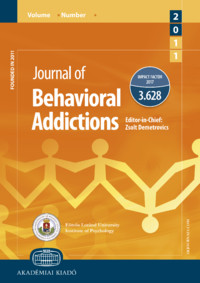Modelling the contribution of metacognitions and expectancies to problematic smartphone use
Modelling the contribution of metacognitions and expectancies to problematic smartphone use
Author(s): Silvia Casale, Giulia Fioravanti, Marcantonio M. SpadaSubject(s): Behaviorism
Published by: Akadémiai Kiadó
Keywords: anxiety; boredom proneness; depression; expectancies; metacognitions; problematic smartphone use
Summary/Abstract: Background and aims: In the current study we have sought to clarify the contribution of metacognitions concerning smartphone use relative to smartphone use expectancies in the relationship between well-established predisposing psychological factors and problematic smartphone use (PSU). We tested a model where psychological distress, impulsivity, and proneness to boredom predict metacognitions about smartphone use and smartphone use expectancies, which in turn predict PSU. Methods: A sample of 535 participants (F 5 71.2%; mean age 5 27.38 ± 9.05 years) was recruited. Results: The model accounted for 64% of the PSU variance and showed good fit indices (c2 5 16.01, df 5 13, P 5 0.24; RMSEA [90%CI] 5 0.02 [0–0.05], CFI 5 0.99; SRMR 5 0.03). We found that: (i) when it comes to psychological distress and boredom proneness, negative metacognitions, and both positive and negative expectancies play a mediating role in the association with PSU, with negative metacognitions showing a dominant role; (ii) there is no overlap between positive expectancies and positive metacognitions, especially when it comes to smartphone use as a means for socializing; (iii) impulsivity did not show a significant effect on PSU Direct effects of the predictors on PSU were not found. Discussion and conclusions: The current study found additional support for applying metacognitive theory to the understanding of PSU and highlight the dominant role of negative metacognitions about smartphone in predicting PSU.
Journal: Journal of Behavioral Addictions
- Issue Year: 10/2021
- Issue No: 3
- Page Range: 788-798
- Page Count: 11
- Language: English

